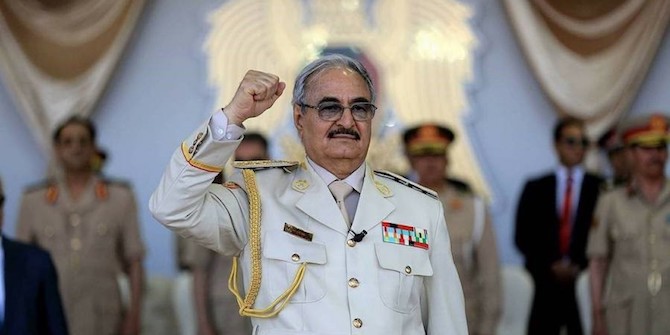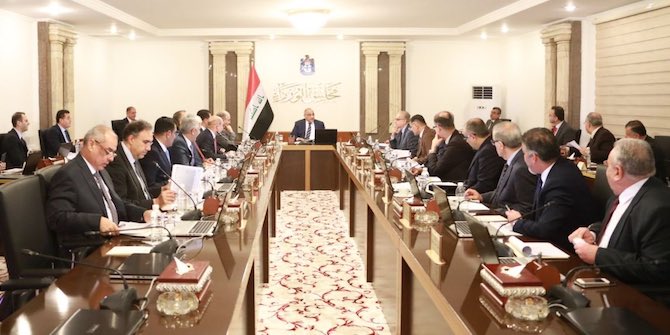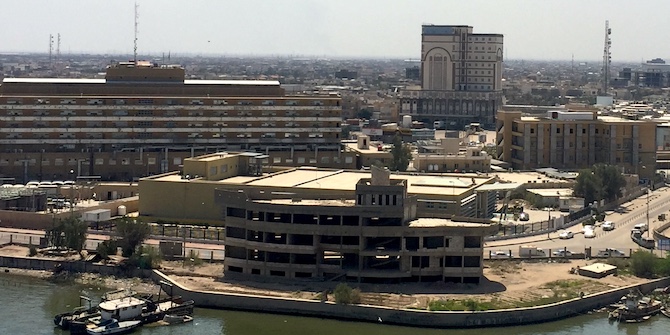by Youssef Cherif

The recent uprisings in Algeria and Sudan have been celebrated as an Arab Spring 2.0. It is a nice metaphor, but these events are not exactly that. The closest comparison would be Egypt in 2013, when the army establishment exploited a popular uprising to consolidate its power and confiscate politics. The Arab world has entered a new era of coups, and democratic hopes are fading away. Arab generals, with the flamboyant attitude of the Latin American caudillos of the nineteenth and early twentieth centuries, believe they are messianic figures tasked with saving (and ruling) their nations. The ‘stability’ that soldiers seem to have now imposed, however, is a recipe for future upheavals.
Postcolonial Arab politics, from the 1950s to the 1970s, was punctuated by coups and attempted coups. Army officers, often with pan-Arab and anti-imperialist tendencies, frequently revolted against the ruling establishments. Some have built durable regimes, such as the Assad dynasty in Syria (lasting almost half a century), Muammar Gaddafi in Libya (which lasted more than four decades), or Saddam Hussein in Iraq (who ruled for almost three decades). From the 1970s onwards, the trend of putsches decreased. Moreover, as the Cold War was ending, it was more fashionable to wear suits and ties than military fatigues. Military councils were slowly being replaced by bureaucratic ruling parties. Sham elections became the norm. The armed ‘Brother Commander’ morphed into a civilian-looking ‘Honourable President’.
Furthermore, many aging officer-presidents wanted to pass power to their sons or other favourites (as in Egypt, Libya, Tunisia and so forth). On several occasions, they groomed civilian relatives who were more interested in self-enrichment than martial prowess: few joined the army ranks. By the 2000s, it was clear for the different military establishments that life under the successors would be tougher. In 2011, therefore, Arab officers were as frustrated as the popular masses.
Coups are rarely called coups. Generals rise up in the name of ‘the people’ and ‘democracy’, they topple corrupt and inefficient regimes and promise to establish more egalitarian and efficient systems. Such promises are rarely fulfilled, and usually initiate a vicious circle that leads to another coup and the establishment of a similar regime. In the Arab world, the 1990s and 2000s were almost devoid of such events. The Arab Spring, therefore, triggered their return. Yet it seems that generals, having adapted to new conditions, now wait for popular uprisings before taking power. They can then call their coups: ‘responding to the people’s call’. These are the revolution-coups.
Tunisia is an exception. In January 2011, when the uprising had spread throughout the country, the army withdrew its support from the president. This, according to most accounts, forced him to flee the country. Although the army’s role increased from then on, it did not interfere in politics the way other armies in the region have tended to. In Egypt as well, President Mubarak’s fall was facilitated by the army. But Cairo’s officers had a different plan from this point: managing the popular movement. They established themselves as guardians of the state and the democratic transition. Yet when it became clear that democracy would erode their powers, a new generation of officers led by General Abdelfattah al-Sisi moved-in. They used the popular discontent and fear of the Muslim Brotherhood to topple the civilian government and establish military rule, with al-Sisi now probably president for life.
In Libya, the advance of self-appointed Field Marshal Khalifa Haftar has also supposedly been sanctioned by popular demand. Haftar has assembled around him many of Gaddafi’s disbanded army, and claims to respond to the people’s call. Haftar’s narrative and aesthetic are near-identical to al-Sisi’s. In Algeria, where an incapacitated civilian president functioned as a puppet in the hands of a corrupt clique of relatives, the army also positioned itself as the guardian of the state. When a popular mobilisation against the ruling oligarchy reached its climax, General Ahmed Gaid Salah, the head of the army, decided to strike. However, at 79 years of age his motives may well be different than al-Sisi’s. Sooner or later, he will be replaced by a younger officer tasked with maintaining the army’s grip on power. In Sudan, similarly, the army took popular discontent as a cue to topple the president and establish a military council, using a rhetoric similar to that of Egypt’s Supreme Council of the Armed Forces (SCAF). With the dice continuing to roll in their favour, the Arab caudillos believe this is their moment.
These combined revolution-coups, moreover, are often backed by the Saudi-Emirati axis. For Riyadh and Abu Dhabi, authoritarian stability is preferable to what they consider the chaos of democracy. Furthermore, democracy has heretofore brought to power the allies of their foes, Qatar and Turkey, i.e. the Islamists. The two regimes consequently mobilised their economic, diplomatic and media resources to support al-Sisi and Haftar, to give two pertinent examples. In Sudan, they have already pledged $3 billion in support of the new regime. In Algeria, rumours regarding their support for Gaid Salah abound.
A trend has also emerged whereby the traditional Liberal centres of the world are moving to a more Realist concept of world politics, that pushes aside theories of the ‘Democratic Peace’. Strongmen are accordingly not facing much resistance from the liberal international community, and can count on massive support from abroad.
Images of enthusiastic protesters with sophisticated slogans written in English, or of a young woman dressed like a queen from a Classics textbook, are indeed positive motifs and reasons for hope. The fact that hundreds of thousands of citizens from all sections of society demonstrated in Algeria and Sudan, braving curfews and breaking their chains, is also unique in itself and a reason to marvel. Besides, these events shook regimes that seemed untouchable and toppled dictators who looked immovable.
But what power has a performer’s raised hand in front of a tank? What can a group of young protestors do when soldiers start firing? What is the international community, led by the weakened and humiliated United Nations, going to do? They are unlikely to advance past issuing a few condemnations and shedding tears. Populist leaders with military inclinations are springing up across the globe. The idealistic youth of the Arab world will hence struggle to find support in Washington and Europe, while their authoritarian masters can get military and financial support from everywhere. In the Arab world, it is not only democracy that is in decline, but also civilian politics. If this is not stopped, it will presage more violence and upheaval in the upcoming decades.
 Youssef Cherif is a Tunis-based political analyst and a member of the Carnegie Endowment for International Peace’s Civic Research Network. He tweets at @Faiyla
Youssef Cherif is a Tunis-based political analyst and a member of the Carnegie Endowment for International Peace’s Civic Research Network. He tweets at @Faiyla






